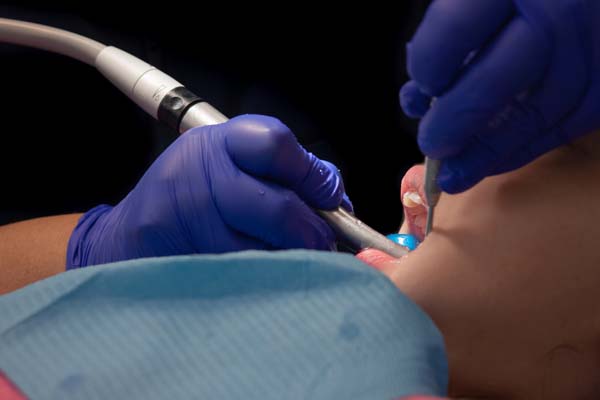Why Cavities Always Require Immediate Attention

Cavities are a very common dental issue. Leaving a cavity untreated can lead to serious complications, including tooth loss. Read on to learn about the importance of treating cavities.
About the importance of treating cavities
You should schedule a visit with a dentist anytime the signs of a dental cavity develop to avoid worsening concerns. The following is a detailed review of the importance of treating cavities promptly and how to recognize cavities when they develop.
What are dental cavities?
Dental cavities are permanent small holes in teeth. They form as a result of acidic attacks that occur when food particles (e.g., sugar) and bacteria combine. When this occurs, the enamel (the outermost layer of teeth) begins to break down slowly, and the weakened enamel eventually erodes away, leaving small dark spots on the teeth.
What are the symptoms of a cavity?
The most notable symptoms of cavities are dark spots on teeth, tooth sensitivity, tooth pain, and gum swelling. Some patients do not experience any painful symptoms when cavities develop, depending on the severity of the cavity and the location of the tooth. It may also be hard to see the cavity as well if it is on the back of teeth or further back in the mouth on the chewing surfaces. Due to this, regular check-ups with a dentist are encouraged in order to detect cavities as early as possible to reduce the risk of painful symptoms and the need for more invasive treatment.
What are the risks of leaving a cavity untreated?
As cavities become deeper and wider, the symptoms are likely to worsen, leading to severe sensitivity and pain. Additionally, the more severe the tooth decay becomes, the harder it is to treat the concern. A minor cavity can often be filled with a non-invasive dental filling procedure, whereas a larger and deeper cavity may require root canal therapy and the placement of a dental crown.
A cavity that is left untreated can also increase the risk of oral infection and/or gum disease. The ultimate result for many teeth that are untreated is the loss of the tooth, either through a necessary extraction or due to the tooth falling out on its own.
How soon after a cavity develops should I seek treatment?
If you notice a potential cavity based upon the symptoms described above, then be sure to schedule a visit with a dentist right away to have it examined and promptly treated. An immediate visit is not necessary if the symptoms are minor and the tooth is protected at home, although severe symptoms indicate a need for emergency dental treatment.
What are the treatment options for a cavity?
The most common treatment for a dental cavity is a dental filling. This procedure involves cleaning the tooth and filling the tooth with an amalgam, composite, silver, or gold material; tooth-colored crowns are more common than metal alloy or gold fillings. As mentioned, for a more severe dental cavity, root canal therapy may be necessary, which involves cleaning deeper toward the tooth’s root and providing a larger filling of a material known as gutta-percha. Dental crowns are usually placed over the tooth to protect it after a root canal.
How can I help prevent cavities after treatment?
After treatment for a cavity, it is important to focus on the prevention of future dental cavities. Of course, the best way to do this is by keeping the enamel strong, clean, and healthy. This can be accomplished by brushing regularly with fluoride-based toothpaste and using a mouthwash that contains fluoride, which strengthens the minerals in dental enamel. Regular dental visits (every four to six months) are also encouraged to remove plaque and tartar that can accumulate on dental enamel over time.
What can I expect during cavity treatment?
During a filling, the dentist numbs the tooth and surrounding areas of the tooth receiving the filling. The tooth is then thoroughly cleaned and disinfected. Next, the dentist applies the filling material, ensures it is smooth with a natural appearance, and then hardens it with a special curing light.
Do you think you might have a cavity?
If you are experiencing any symptoms of cavities such as dark spots on teeth and tooth sensitivity, then contact our dental office today to schedule a visit as soon as possible. During your visit, we can discuss your treatment options and help you find the right solution for cavity treatment.
Request an appointment here: https://www.korsmofamilydental.com or call Korsmo Family Dental at 2533360016 for an appointment in our Tacoma office.
Check out what others are saying about our services on Yelp: Read our Yelp reviews.
Recent Posts
When it comes to health and wellness, prevention plays an integral role. In addition to making healthy lifestyle choices, practicing routine dental care is a vital step in maintaining a healthy mouth and body. There are numerous benefits for patients who commit to proper home and professional dental care.Routine dental care is necessary to maintain…
Professional teeth cleaning is an important aspect of routine dental care. In addition to practicing thorough oral hygiene habits that include regular brushing and flossing of the teeth, patients should always maintain biannual dental exams to ensure excellent oral health.The following are a few of the numerous benefits that regular teeth cleanings offer when included…
Daily oral hygiene habits should not be considered a substitute for the routine dental care that occurs during a dental checkup and cleaning. There are oral health concerns that a dentist will be able to proactively address during an office visit, but the equipment and tools used to care for both teeth and gums are…
When patients go for routine dental care, they may or may not have X-rays taken of their mouths. Dentists use these important diagnostic tools to check all layers of the tooth. While a key part of routine care, X-ray imaging may not be taken every visit. Every patient is different, and the recommended frequency for…


